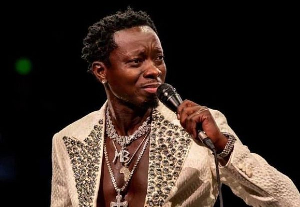Diasporia News of Tuesday, 16 December 2014
Source: YAW NKETIA
The Xmas Bonanza: A hairy conversation with Don of the Dreads
As the celebration of Christmas comes alive, many are those who will be going in for a total make- over as far as beauty, hair and its dressing is concern.
However few will be those who would know what they have actually done to their hair, come January next year.
With the proliferation of hair gels, styles and extensions damaging the quality of the Afro-hair, it is time people knew what brutality they are causing to their hair.
Instead of sitting and pondering over peoples’ hearsays, we stepped up the ante by approaching a professional, who knows all about the Afro-hair and its nurturing.
Don Abaka is a professional hair stylist who has been working in the hairdressing industry in the UK for over forty years.
Given his experience and expertise, he has being approached to share with the black community ‘the essence of keeping the black hair........... Natural’.
Catching up with him in the environs of his hair studio, this is how he explained issues.
What is the importance of keeping our hair healthy?
Well keeping our hair healthy is important because, it’s part of our appearance. People notice that about us quiet a lot. They might see your hair style and upon a closer look, they may realise you have a healthy hair.
Now and again if you have a healthy hair, you tend to spend less time in the salon for treatment. This is because, you can cope with it.
When it’s dry and brittle, then you find yourself having to go for more and more treatment in the salon every now and then.
A lot of the time, you can actually take care of your hair at home if you are quick in the knowledge of dealing with it. You end up saving both time and money.
How does the natural black hair grow?
Well the hair grows from eating a healthy diet: a body intake is basically what allows the hair to grow into a good condition or quality hair.
Once the hair comes through the skin, it is then our duty to keep it in a good condition. African hair grows outwardly and upwardly.
So natural oil through the skin does not necessarily filter through to the middle hair from the ends to moisture it and keep it healthy. So we then have to work on improving that, once the hair comes through the scalp.
However once you put a wig on, you need to keep it moisturise by using natural oil (vegetable) on the hair like you do to the skin.
As a professional hairdresser, how would you describe a healthy hair?
A healthy hair often would show moisture and light gloss on the hair. The strength of the hair is equally important. By pulling the hair you can tell how strong it is.
It is said that strand for strand, hair should be as strong as a proper wire. Because the hair gets dry, it tends to get prickle, it's not moisturised properly and therefore breaks easily.
Also we have to be careful what we use on the hair like for example combing and brushing the hair. Metal comb is not good, it cuts into the hair. Certain plastic combs also create a lot of static on the dryness of the hair.
If possible, if you get a comb that's made from a bone, it will be the best for the hair. However since we are in the age of plastics, getting a quality plastic comb might do the job.
How would you explain the advantages of a natural black hair?
Well the advantages of keeping or having a natural black hair, I would say a feeling if you like, because you are on yourself to feel that this thing you have on your scalp or head is grown out from you.
It’s something you take care of just like you would brush your teeth. It helps you to project a good feel of wellbeing having a natural hair. It is said that by taking care of your hair one would take care of themselves.
Is there any reason our hair should be kept natural?
There is a big reason for that. I think natural hair lessens your cost, because hairdressing has become an expensive lifestyle nowadays, especially in the Afro-market.
However there are loads of options when keeping a natural hair. A lot of people think that they cannot cope with a natural black hair. But I cannot see anything easier than what’s natural.
And if you have a synthetic hair then one thing is that, you will sweat a lot more on your head. With that it creates a bad condition on your scalp.
For example stiffness or sometimes dandruff and even dryness of the skin, or irritation from wearing synthetic hair. For me, I would go for the natural anytime.
What are the facts about black hair?
It’s again very different in its natural state than any form of hair due to how it’s grown. Some of the facts about black hair is that when putting extreme tension while plaiting or weaving, it can cause hair loss, especially at the front hairline.
Also when misapplying a synthetic wig and weave, that can cause damage to the hair follicles.
And also covering the natural hair with synthetic hair, hampers the growth, because the scalp needs to breath for a healthy growth and therefore stimulates good growth. We need to keep the hair breathing.
What more do we need to know about natural black hair?
The whole thing is that, we need to feel proud of ‘this thing’ we have on our head called hair for starters. Because if you feel proud about it, then you would do something about it.
You can inquire from a professional hair stylist as to what kind of style might suit you. However you must also be open to the advice on natural hair but not see it as something which is not part of you.
And as far as beauty goes, there are many different looks we can create from a natural hair. We have always done it, there is no reason why we cannot continue to do so.
And I know with the ‘straight hair’ thing (European hair extensions), it’s fashionable and if a friend has it and you feel it looks smart and attractive, you would want to have similar.
But you must also think carefully before you make those choices, but I think most people are not informed before they have something done.
They walk into a salon and say ‘I want a weave’ there is never a consultation as such. It’s more like what sort of length do you want it and that is the end of it.
You know we have to look at our health as well and how these things are applied. Some people might use the needle and thread to apply. I braid with one’s natural hair, providing it’s not too tight on the head.
However, there are also additives like glue that some use to stick the hair on the scalp and that is dangerous.
In fact, there is information that sometimes when the hair gets hot, pores get open to these additives, thereby giving in to all sorts of health risks beneath the scalp.
So therefore we have to be careful with the choices we make, and we should be well informed. So partly, we the professionals and the consumers should take responsibility in this situation.
As hairdressers we have to be professional enough and honest to our clients, as to what we think, and they have to be open enough to listen and adhere to the information we give them.
And hopefully we can have and enjoy a healthy growth of hair and something that we can feel proud and walk around with.
As a professional in your domain, how would you describe yourself?
If anything, I would say I am an artist in hairdressing. Not from the point that I can create a good look, because there are so many people who can create a good look.
But I always think artists are the conscience of the society they live in, and I feel in hairdressing, I try to be that conscience, therefore I see myself as an artist than anything else.
What is the way forward in the manner feel and treat their hair?
The way forward is very simple, because I will be coming out a documentary which encapsulates how to counter all these Afro hair issues, while having our confidence and consciousness back.
When is that?
That will be by October 2015 to meet the Black History Month.
BY YAW NKETIA: TOUCHING YOU FROM A DISTANCE WHILE COLLECTING, COLLATING AND REPORTING AS JOURNALISM DEMANDS.










